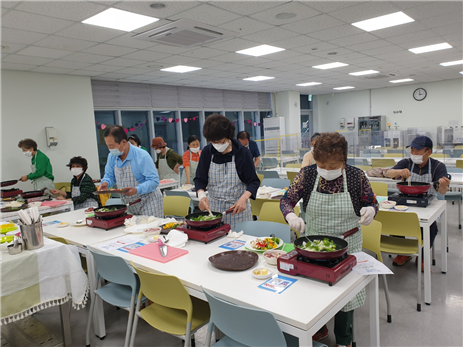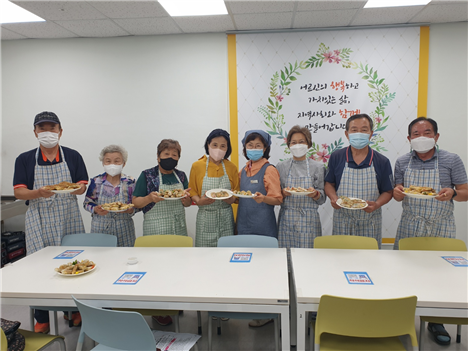※ Introducing Korea’s Best Practice of Local Governments for Older Persons. This is a monthly report that aims to introduce examples of outstanding policies and practices adopted by local and municipal governments in Korea to help older persons exercise their human rights. These examples are selected with reference to the report ‘Human Rights to be Included in the New UN Convention on the Rights of Older People’, published by the National Human Rights Commission of Korea in 2018. While various attempts have been made by local and municipal governments in Korea to improve the well-being of older persons, they are not very well known outside the country. ASEM Global Ageing Center (AGAC) aims to fill this gap by introducing in depth the best practices local governments have implemented in the interests of older persons.
A Happy Meal Together
Until the early 2000s, eating alone in a restaurant was unusual in Korea. There were not many restaurants that offered seats to individuals eating alone, and the social atmosphere did not encourage it. However, it is now common to find people eating on their own in a restaurant. Nowadays, ‘Honbab’, a portmanteau term for eating alone, is commonly used in Korea. However, there are still many people in Korea who prefer eating together rather than eating alone. Several studies have found that older persons living on their own are more economically, physically, and psychologically vulnerable than other groups (Ryu & Lee, 2019; Kim, 2022; Lee & Choi, 2021).
According to Statistics Korea, the proportion of older persons living alone has increased rapidly, from 3.8 per cent in 2000 to 6.1 per cent in 2010 and 7.9 per cent in 2020. Older persons living on their own attract social attention because they often experience problems such as depression, poverty, loneliness, and suicide. In order to reduce the vulnerability of this group, the Korean government and local governments are making efforts to provide communal living homes and rental apartments, deliver lunch boxes, and distribute Artificial Intelligence (AI) care robots. This Report Note introduces a project called ‘A Happy Meal Together’, introduced by the Songdo Senior Welfare Center in Incheon, South Korea, in which older persons living alone cook and eat together.

The project has two purposes. First, based on Article 4 of the Welfare of Senior Citizens Act (Responsibility for Promoting Health and Welfare), Incheon Metropolitan City sets out to improve the health of older persons in the region by providing customized meals that address diabetes, high blood pressure, and so on. Secondly, the project promotes opportunities to revitalize small-scale social relations through joint cooking and dining programs.
The project is being carried out every Wednesday, June to November 2022, from 14:00 to 16:00, at the Songdo Senior Welfare Center. A total of 60 older persons, including those living on their own, those with depression, and those on low incomes, are invited to participate in classes on diet and cooking, and engage in small-scale co-cooking and eating. This project consists of a total of six sessions, and all six sessions are conducted with the same curriculum. Each session consists of four classes, and each class is held once a week with around ten participants. Food is selected from a low-salt diet tailored to take account of diabetes, high blood pressure, and so on, and all ingredients are prepared at the welfare center. The total program budget is 6.8 million won.

A satisfaction survey of ‘A Happy Meal Together’ project has been conducted, so that it can be used as a guide to whether the program will continue in the future. On 13 July 2022, the first session (total 6th session) was completed, and the first satisfaction survey of the project was conducted. This survey asks questions about reasons for participation, satisfaction with the program, and changes after participation. Several participants said that they had participated in the project in order to learn how to cook meals. Most respondents said they were satisfied with 1) the recruitment and selection process; 2) the lecture, and information about diets; 3) the environment, including the venue, and the goods provided; 4) their relationship with other participants; and 5) the project overall. One participant said, 'It was good that the nutritionist called me, and I could cook and eat with my peers. I want to participate in the next section as well.'
This project is significant from the perspective of the human rights of older persons. Older people who live alone lack opportunities to participate in various social activities compared to other age groups. The project, ‘A Happy Meal Together’, is meaningful in that it promotes the participation of older persons in social activities and enables them to spend time with others. The high levels of satisfaction recorded by participants prove that the project is successfully contributing to promoting the human rights of older persons in the Incheon Songdo community. The Songdo Senior Welfare Center is striving to plan and implement other diverse programs to promote the human rights of older persons by discovering further blind spots in the society – like the problem of older people in its community eating on their own.
Reference
Ryu, H., & Lee, M. A. (2019). Eating alone and depressive symptoms of Korean older adults: Examining differential effects by gender. Survey research, 20(1), 1-27.
Kim, H.S. (2022). Effect of Eating Alone and Type of Meal Skipping on Depression in the Elderly. Korea Society for Wellness, 17(2), 329-336.
Lee, S. B., & Choi, Y. J. (2021). The Relationship Between Eating Alone and Quality of Life: A Comparison by Generation. The Journal of Humanities and Social Sciences, 12(5), 1165-1175.
Jaesung Lee (being08@asemgac.org)